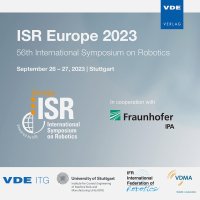Implementation of a ROS-based Digital Twin Approach of a Multi-Robot Cell for Incremental Manufacturing
Konferenz: ISR Europe 2023 - 56th International Symposium on Robotics
26.09.2023-27.09.2023 in Stuttgart, Germany
Tagungsband: ISR Europe 2023
Seiten: 8Sprache: EnglischTyp: PDF
Autoren:
Opolka, Anna Marie; Griemert, Rudolf; Wacker, Christian; Wagner, Arne; Droeder, Klaus (Institute of Machine Tools and Production Technology, Technische Universität Braunschweig, Germany)
Inhalt:
The rise of Industry 4.0 continues to revolutionise modern manufacturing through the integration of digital technologies and automation, opening up opportunities to improve efficiency, increase productivity and reduce costs. One of the key components of this transformation is the concept of digital twins, which allows for the creation of virtual replicas of physical systems, enabling real-time monitoring, control and optimisation through a virtual environment. In the field of industrial robotics, digital twins provide valuable insights into the behaviour and performance of robots, thereby facilitating the optimisation of robotic tasks and movements. With the increasing adoption of digitalisation and automation, digital twins have become an essential tool for manufacturing efficiency and effectiveness. The use of digital twins in robotic environments is therefore a key enabler of Industry 4.0, providing new opportunities to increase the manufacturing productivity through an increased planning and predictive accuracy and enhancing marketability in the global market. This research addresses the development and implementation of a digital twin within the Robot Operating System (ROS) environment for a hybrid multi-robot manufacturing system, providing a comprehensive overview of the required aspects of digitalisation for hybrid robot processes. Based on this setup, a digital twin approach for a multi-robot manufacturing cell is presented and discussed. With the overview and research generated within this publication, further optimisations of hybrid multi-robot cells regarding the interaction of movements and tasks as well as overarching process analysis and optimisation can be developed.


